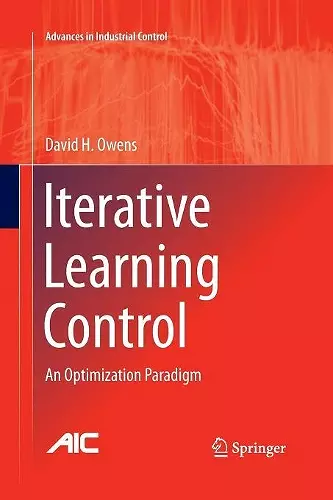Iterative Learning Control
An Optimization Paradigm
Format:Paperback
Publisher:Springer London Ltd
Published:23rd Aug '16
Currently unavailable, and unfortunately no date known when it will be back

This book develops a coherent and quite general theoretical approach to algorithm design for iterative learning control based on the use of operator representations and quadratic optimization concepts including the related ideas of inverse model control and gradient-based design.
Using detailed examples taken from linear, discrete and continuous-time systems, the author gives the reader access to theories based on either signal or parameter optimization. Although the two approaches are shown to be related in a formal mathematical sense, the text presents them separately as their relevant algorithm design issues are distinct and give rise to different performance capabilities.
Together with algorithm design, the text demonstrates the underlying robustness of the paradigm and also includes new control laws that are capable of incorporating input and output constraints, enable the algorithm to reconfigure systematically in order to meet the requirements of different reference and auxiliary signals and also to support new properties such as spectral annihilation.
Iterative Learning Control will interest academics and graduate students working in control who will find it a useful reference to the current status of a powerful and increasingly popular method of control. The depth of background theory and links to practical systems will be of use to engineers responsible for precision repetitive processes.
“This book presents a comprehensive study of ILC from the optimization paradigm, more specifically, the NOILC optimization paradigm. The organization is clear, and the necessary fundamentals are self-contained. The mathematical analysis is rigorous, and the algorithms are detail complete. This book is suitable for academic researchers … . It can be used a textbook for graduate students who are interested in ILC. It also gives rich motivations for researchers to study ILC from the optimization perspective.” (Li Xia, IEEE Control Systems Magazine, Vol. 37 (2), April, 2017)
“This is a seminal text since it is very likely to generate interest and enthusiasm in the whole topic, and it provided a comprehensive overview of the mathematical methods that can be applied. It is very suitable for researchers in advanced control but it will also be useful to engineers involved with multi pass or repetitive processes where learning can provide a substantial improvement.” (ACTC applied control technology consortium, actc-control.com, March, 2016)
ISBN: 9781447169284
Dimensions: unknown
Weight: 7256g
456 pages
Softcover reprint of the original 1st ed. 2016